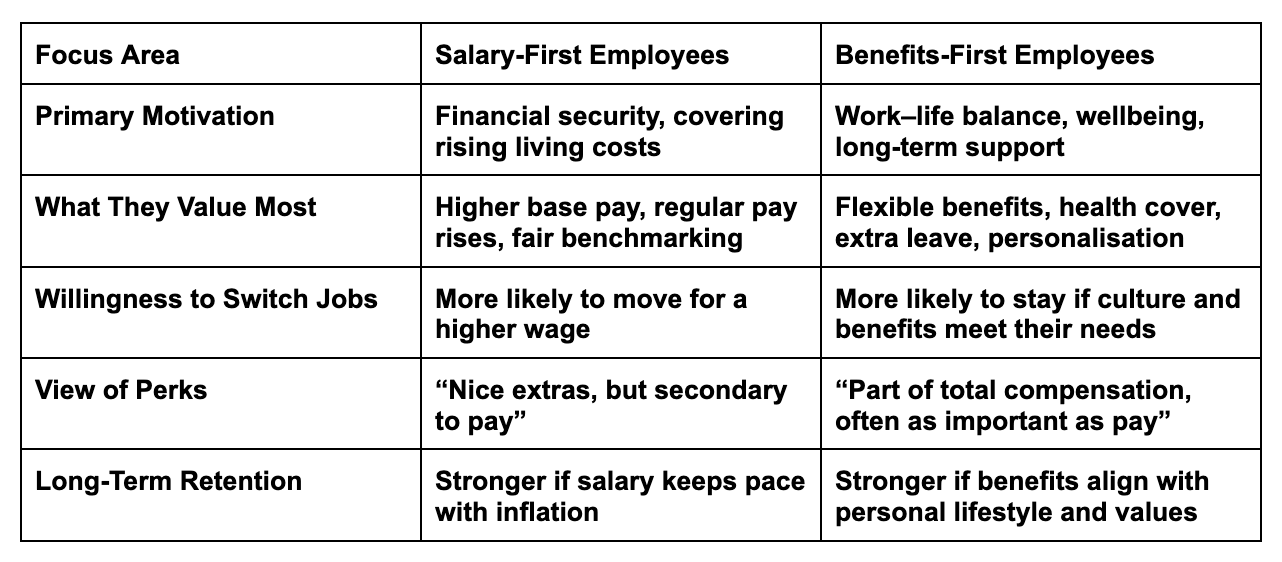The UK workforce is going through a period of adjustment. After several years of rising inflation, a cost-of-living crisis, and slowing economic growth, British employees are looking at their pay packets — and their perks — with a sharper eye. For HR leaders, the question is clear: in 2025, what matters more to staff, salary or benefits?
The answer is nuanced. While take-home pay remains the top concern for many, surveys show a shift towards valuing flexibility, wellbeing, and personalised benefits. In other words, employees are not just asking how much they’re paid, but how well they’re supported.
The Economic Backdrop
The past few years have tested both employers and employees. Wages have struggled to keep pace with inflation, particularly in sectors such as retail, hospitality, and the public sector. Energy bills, food prices, and housing costs have eaten into disposable income.
For many British workers, this has sharpened their focus on financial security. Yet at the same time, the pandemic left a lasting legacy: people now value time, wellbeing, and flexibility more than ever. The UK economy may be reclining, but expectations around work–life balance are here to stay.
Salary: The Baseline Employees Can’t Ignore
It’s no surprise that salary remains the number one driver in job decisions. In an era of rising living costs, a competitive wage signals both stability and fairness. Employees in the UK are more willing to move jobs for even modest pay rises, particularly when real wages are squeezed.
For employers, this makes pay benchmarking essential. Falling behind the market rate risks not only losing staff, but also damaging employer reputation. HR teams should regularly review salaries against industry standards and regional variations.
But salary alone no longer seals the deal. Surveys show that once basic financial security is met, employees begin to weigh other factors just as heavily.
Benefits: More Than “Nice-to-Have”
The traditional view of benefits — gym memberships, free fruit, or cycle-to-work schemes — is being replaced by a more personalised approach. In 2025, UK employees are asking:
- Does my benefits package reduce financial stress?
- Does it support my health and wellbeing?
- Does it give me flexibility to choose what matters to me?
Health insurance, childcare support, and retirement contributions rank highly. But there is also growing demand for flexible perks — from extra holidays to learning stipends and mental health support.
In short, benefits have shifted from “perks” to critical components of total compensation. For HR managers, this means reviewing not only what’s offered, but how relevant those benefits are to staff needs.
How Employee Priorities Are Changing
Recent UK surveys highlight several trends:
- Financial wellbeing is front of mind. Employees want support that helps them manage the cost of living, such as discount schemes, financial education, or salary advance options.
- Flexibility beats status symbols. Staff are more likely to value an extra day off or flexible working than traditional office perks.
- Personalisation matters. One-size-fits-all packages are losing appeal. Employees increasingly expect choice in how benefits are allocated.
- Recognition and culture count. Feeling valued is as important as material rewards. Recognition programmes
- help retain staff even when pay rises are limited.
HR’s Role in Balancing Salary and Benefits
So how should HR leaders in the UK respond? The answer lies in balance. Salary must remain competitive — that’s the baseline. But benefits provide the differentiator in a market where many employers cannot endlessly raise wages.
Practical steps include:
- Conducting regular staff surveys to understand what employees value most.
- Using personalised benefits platforms to offer choice and flexibility.
- Communicating benefits clearly, so staff understand their full value.
- Linking benefits to wellbeing, not just financial perks.
Looking Ahead: What UK Employees Really Value in 2025
The debate is no longer “salary versus benefits” but “how do the two work together?” In a reclining economy, employees expect a fair wage — but they also want employers who understand their broader needs.
For HR professionals, the challenge is to recognise that salary secures staff, but benefits engage them. Striking the right balance will not only attract talent but also build loyalty at a time when retention has never been more important.

In 2025, UK employees want both financial security and meaningful support. A competitive salary remains the foundation, but the true differentiator lies in benefits that are relevant, flexible, and personal.
HR leaders who embrace this shift will stand out in a crowded market. Those who ignore it risk losing staff to employers who understand that in today’s Britain, value goes beyond the pay slip.


%20(4).png)


%20(5).png)



